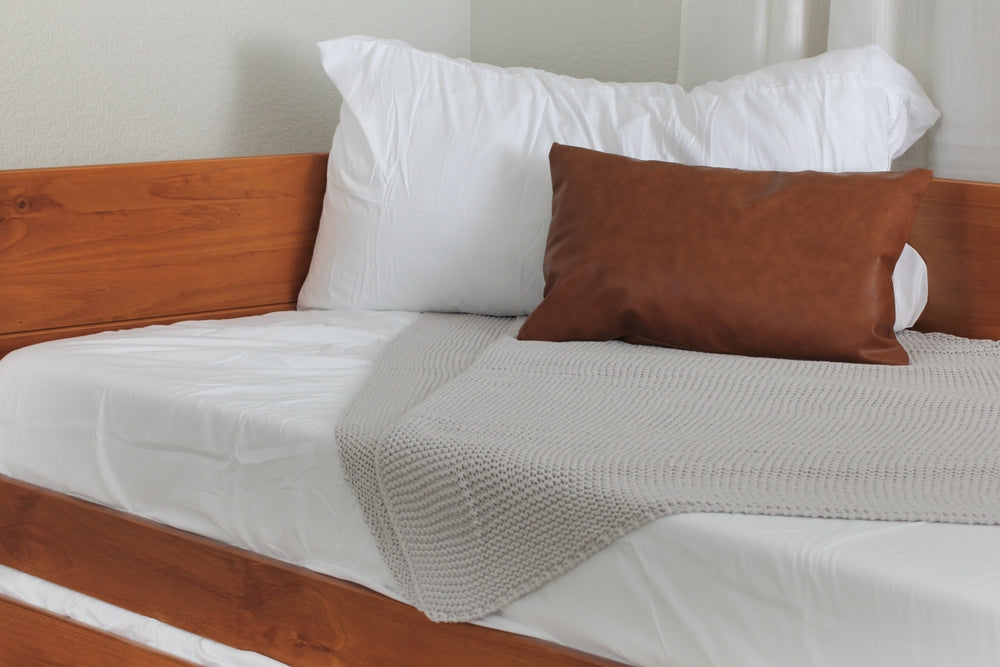Free U.S. Shipping On Orders Over $150

A Complete Guide to Cotton Bedding Thread Counts: What Matters and What's Hype
Posted on
Companies selling cotton bedding love to talk about thread count. Many especially tend to hype up the thread count of their bed sheets with some of the mentioned figures going as high as 1,000 or more.
In this guide, we explain everything you need to know about thread count in cotton bedding including sheets, pillowcases and duvet covers. We explain what it is, why it matters and how to separate truth from hype.
What Is Cotton Thread Count?
Thread count, or simply TC, is a measure of the number of cotton threads per square inch of fabric. It’s a combination of horizontal threads (weft) and vertical threads (warp).
Long ago, thread count was a true indication of the fineness and softness of cotton bedding. Sheets made with a lower thread count used coarser yarn that made them feel rough. Higher thread count bedding was made with finer yarn that gave it a softer feel.
Today, that’s still the case but only to a degree. Some manufacturers have found ways to manipulate thread count. They advertise a higher thread count that does not necessarily increase the quality of their bedding.
What’s a Good Thread Count for Cotton Bedding?
Listening to manufacturers, you’d think thread count is the most important aspect of cotton bedding. In truth, there are other equally important features to consider such as the type of weave, whether the cotton is organic and the type of cotton used.
When it comes to thread count, there is a reasonable range beyond which you can be sure it’s all hype. True thread count for 100% cotton sheets ranges between 132 and 600.
Anything with a thread count below 200 can feel thin and a bit coarse. On the upside, cotton bedding with under 200 TC is affordable and often has excellent breathability since there’s plenty of space for air to flow through.
200 to 300 thread count is considered good. Cotton sheets and pillow cases in this range are soft without being too heavy or hot. Most of them are also affordable.
Luxury cotton bedding typically has a 300-600 thread count. This is where you get sheets that feel ultra-soft and supple. Be careful though; the higher the thread count, the lower the airflow since the sheets are denser. So high TC sheets (over 500) can feel a bit too warm, especially in the summer.
How Some Manufacturers Manipulate Thread Count - And Why That’s Bad For Quality
When you go shopping for cotton linen, you’ll certainly notice bed sheets with 600+ thread counts. It’s not crazy to find even 1500 and 3000 TC sheets. How’s this possible and are they better?
Here’s how some manufacturers manipulate thread count, and why that’s bad for the quality of sheets.
- Using lower quality and thinner threads - some manufacturers will use lower quality cotton that can be spun into thinner threads. They are able to cram more threads in a square inch, but the bed sheets tear easily and don't last long.
- Using multiple plies in a single thread - this is a common trick. Manufacturers will label a sheet as having a 1,000 thread count, but in reality, it is a 500 TC bed sheet that uses 2-ply threads (two threads spun into one). Some manufacturers will even use 4-ply threads, resulting in crazy 3,000 thread sheets. Single ply cotton bedding is the best. It’s softer, more pliable and more breathable.
- Cramming more threads into the fabric - Some high TC (over 600) bed sheets don't have any trickery. The problem is that the manufacturer crams so many threads in a square inch that the sheets are no longer as comfy. They feel heavy and hot, and can leave you sweaty and uncomfortable at night.
- Adding unwoven threads - In some cases, manufacturers will add extra threads that are not woven into the fabric. They then claim a high number to impress potential customers. The extra threads do not make the sheets stronger and can actually make them feel rough.
Final Thoughts
Is thread count important when buying cotton bedding? Yes, it is but not to the degree some brands will have you believe.
In fact, the first thing to look for when shopping for cotton sheets is not thread count. Start with the type of weave you want: percale for cool sheets, sateen for softer sheets. You can then check the thread count.
If you go with percale, keep thread count under 300. The main point of the percale weave is maximizing breathability. A too-high thread count messes with that.
If you go with sateen, anything between 300 and 600 is fine. Stay on the lower end if you want soft sateen sheets that sleep cool.
In addition to weave and thread count, check the type of cotton used. Extra long and long staple cotton sheets are the best. They are made with long threads that produce soft, strong and smooth sheets. Pima, Supima and some Egyptian cotton bedding are made from long or extra long staple cotton.
We also recommend buying organic cotton sheets. They are safer for you (fewer chemicals), better for the environment and more comfortable as well.
Quick links
Contact
6063 Hudson Road #160
Woodbury, MN 55125
Yo@hercLeon.com
Leave a comment: